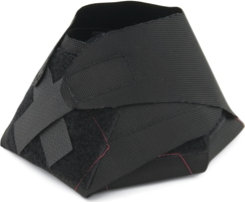Because of conformity issues with the horse’s teeth and jaw as well as due to basic diets of less fiber and natural grasses the horse will often not be able to wear down or polish his teeth very well. This creates an un-even bite, or “hooks” and “points” on his back molars and can lead to the horse not being able to chew his feed very effectively, which of course impacts on increased chance of colic. If the “points” and “hooks” are severe enough, they can wear sores on the inside of the horse’s mouth which can cause eating problems and even behavior problems, especially when wearing a halter or bridle. If you have ever broken a tooth and had the sharp end digging into your cheek you know what I mean when I say this can be very painful.
Care for a horse’s teeth, in a field known as equine dentistry, is through a Vet check of the horse’s mouth and teeth “floating” where the Vet rasps or grinds a horse’s teeth back into a smooth and usable condition. Floating teeth can be done “manually” using a rasp or file or the Vet can use an specialized electric drill with a special ceramic type grinding end and this is called “power floating”.
There is a misunderstanding about power floating that it can be very invasive and can tear up the teeth in short order. I have had horse dentist manually and power float teeth. Both are effective, however I would have to say that power floating is not only safer, but more comfortable to the horse and much quicker.
How often do you need to get your horse’s teeth floated? Depends on many factors such as genetics, previous injuries, type of feed they are on,….but to give you an idea, I have my Vet float my horse’s teeth every 14-18 months. The Vet sedates the horse with a combination of Rompum (sp?) and Torbugesic then uses a speculum on a bridle to keep the horse’s mouth open to do the floating.
Signs that your horse needs to have his teeth checked and possibly floated include: eating very slowly; needing more feed than usual to keep weight on; evidence of dropping bolts of partially chewed feed; behavior problems with a bridle, halter or bit; excessive salivating; not liking it when you rub him on the jaw; larger pieces of non-digested feed in his manure. The video below depicts a power floating of the back molars (Floating Part I).
The vet will also correct any problems with the uneven wear on the front teeth (incisors) as well as remove any excessive plaque build up on those teeth. See below video (Floating Part II).
Another overlooked part of Horse Health care for geldings and Stallions is the cleaning of the sheath and penis. A waxy buildup, called a bean, can get lodged near the horse’s urethra and make extension for urination painful as well as the waxy buildup on the inside of the sheath causing pain upon extension. We clean our geldings’ sheaths often and as thoroughly as we can without sedating the horse. But you can imagine how thoroughly you can clean the sheath when the horse is sedated. The third video shows the horse’s sheath being cleaned using water and a anti-septic solution.



















Have you heard about photonic therapy? It seems to be gaining support from people who use it. I understand it was developed by a Vet in Australia and uses red light to stimulate acupuncture points.
ReplyDeleteSheath Cleaning, I'm so glad I have a mare. Great information!!!!
ReplyDeleteNice post Teeth Cleaning Products service
ReplyDeleteGood information on horse tooth cleaning, Horsi is the biggest equestrian community of Australia where you will also get the horse dentistry center information and many more thinks for horse care, training and education.
ReplyDeleteJust like humans, the horse needs tooth cleaning. Sometimes we forget about our horse needs. It's a good thing I found this article. I think all horse owners should consider reading this one.
ReplyDeleteNorfolk Village Dental
ways to maintain shine
ReplyDeleteof teeth